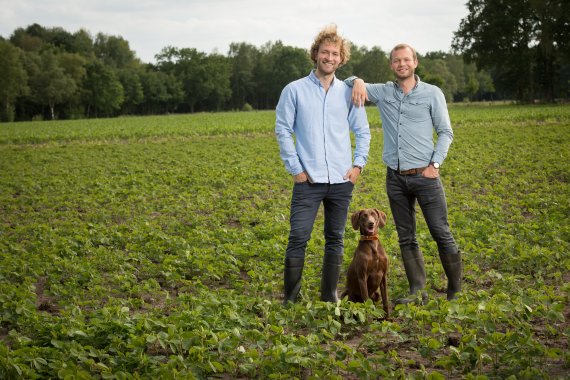Photo: Sven Menschel
The plants on his parents’ farm in Enschede are looking healthy, says Tom Grobben. About 30 centimetres tall with fresh-looking leaves. Although the weeds between the plants are running wild. The Management, Economics & Consumer Studies student (25) and his brother Bart (28), a WUR alumnus, are now investigating how best to deal with this. As sons of a dairy farmer they do have some experience of growing crops such as maize for the cows, but soya bean cultivation is new.
The student is nearing the end of his Master’s degree programme in Wageningen. He is currently on an internship at Wageningen Economic Research, where he is researching business succession in the farming sector. An appropriate topic because, like the farmers’ sons and daughters he has spoken to, Grobben has doubts about taking over his parents’ business.
Entrepreneurial types
‘Cows are great animals and my brother and I both love them but the question is whether we’ve got enough enthusiasm. You always have to be on the spot with cows, 24/7. You have to get up at night too. I’m not sure yet whether I want all that.’ That doubt is a frequent topic of conversation around the kitchen table. ‘Bart and I are real entrepreneurial types. We’d like to continue with the business and we see a future in it. But the question is what kind of future.’ Many different ideas have been put forward in the past few years. The one that got the entire family enthusiastic was Dutch soya beans.
In South America they are still chopping down tropical forests to plant soya fields
Grobben: ‘At the moment, most soya is imported from South America, where unfortunately they are still chopping down tropical forests to plant soya fields. You also have to consider the carbon footprint of the transport, the social impact on the local communities and the whole debate around genetically modified crops. It would make a big difference if we could grow our own non-modified soya here in the Netherlands.’
From Twente – and proud of it
There are only a few Dutch farmers growing soya beans. Conditions in the chilly Netherlands are not ideal for this tropical crop. But the Grobben family, with their two Wageningen-educated sons, were still prepared to go for it. That’s the nice thing about studying at WUR, says Grobben. ‘There is so much knowledge about soya cultivation, for example about new varieties and ways of increasing the yield. Everyone is more than happy to talk to us and help us come up with solutions. That’s a real luxury and you need to exploit that as a student.’
The Grobben brothers not only plan to grow soya beans, they also want to develop a soya product for human consumption. Grobben: ‘In the West, soya is mainly used in the production of animal feed, but food products like tempeh, tofu, soya milk and soya yoghurt are becoming increasingly hip. That’s another reason that it’s ideal I’m studying in Wageningen. StartHub and StartLife have brought me into contact with people who can help us take this initiative further. We want to make something for which there is demand, rather than yet another veggie burger.’ Grobben is not sure yet what it will be. ‘I’d really like to develop a well-balanced product in association with a leading chef and a nutritionist. Preferably a chef from Twente; I’m from Twente and proud of it.’
Pigeons
The soya seeds were sown at the end of April. ‘We were able to borrow the farm machinery from our neighbour and he helped with the sowing as well. It was new for him too. When his phone rang, he would say “I’m planting soya beans at the Grobbens”, and then he’d have to explain the whole story. That was quite funny and eventually all the neighbouring farmers knew about it. They like the fact that we’re trying something new but they are also sceptical. They don’t know anything about soya cultivation and find it strange that we’re putting so much effort into it.’
Grobben will be able to harvest the plants after the summer, when they have grown waist-high. Until then, he is paying regular visits to his parents’ farm. In between, his brother, who lives and works in Enschede, sends him messages with status updates. ‘They say soya is an easy crop but it’s still a worry. Once the first shoots appear, pigeons can demolish the entire field in a week, for instance.’ Fortunately, they were in luck this year. ‘Perhaps the pigeons in Twente haven’t learned to appreciate the delicious taste of young soya plants yet. Or else they weren’t paying attention.’
That the two of us are exploring this entirely new terrain is just fantastic
His parents do have difficulty with the fact that their dairy farm may come to an end, says Grobben. ‘They have never said it in so many words, but they work day and night with the cows. Of course it’s hard to think that might stop. At the same time, in our talks they have always stressed that we should do whatever makes us happy. Our intention is to carry on with the farm — that’s our top priority. That the two of us — Bart and I — are exploring this entirely new terrain is just fantastic.’

